|
|
|
Sort Order |
|
|
|
Items / Page
|
|
|
|
|
|
|
| Srl | Item |
| 1 |
ID:
131984
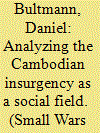

|
|
|
|
|
| Publication |
2014.
|
| Summary/Abstract |
This article investigates power practices in the Cambodian insurgency after 1979 as being part of a social field. There are various types of power practice being exercised by commanders aiming at making soldiers disciplined inside the insurgency. The hypothesis explaining these variations being proposed here is that the type of power being exercised depends on the habitus of the respective commander. Power practices are shaped by the incorporated classificatory discourse of commanders on good soldierhood and leadership. Thereby, armed groups can be analyzed as a social field in which practices are always relational and part of symbolic struggles between different commanders.
|
|
|
|
|
|
|
|
|
|
|
|
|
|
|
|
| 2 |
ID:
105923
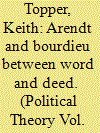

|
|
|
|
|
| Publication |
2011.
|
| Summary/Abstract |
This essay investigates questions about the relationship between language, speech, and democratic institutions by bringing into conversation Hannah Arendt's and Pierre Bourdieu's distinctive views of the politics of language and speech. First, I explicate Arendt's account of the connection between speech, action, and identity disclosure, as well as its role in her broad conception of political institutions. Next, I complicate this outlook by examining Bourdieu's political sociology of language, focusing on the ways that linguistic competences valorized in particular institutional settings operate as mechanisms of silencing, domination, and exclusion. Finally, I bring these approaches together by investigating political events-AIDS activism in the United States during the 1980s and early 1990s-that raise critical issues regarding the politics of language and speech within a specific institutional setting. By reading Arendt and Bourdieu together in the context of these events, one can develop a defensible account of the politics of speech in democratic theory and practice.
|
|
|
|
|
|
|
|
|
|
|
|
|
|
|
|
| 3 |
ID:
158943
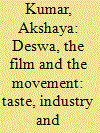

|
|
|
|
|
| Summary/Abstract |
In the last decade, the Bhojpuri film industry has made its presence felt across most of north India, but also in many large cities of peninsular India. However, this emergence has also brought to the fore various questions around taste, class, region and representation. Nitin Chandra’s ‘unreleased’ Bhojpuri film Deswa sought to alter the ‘vulgar’ orientation of this industry, but had to wait for nearly four years to finally release as a Hindi film. Arguing that the vibrant debate that took place on the fundamental distinctions of Deswa is animated by Chandra’s persistent desire to narrate Bihar’s lost glory and utmost disrepair, I assess in this paper the industrial constraints that shaped the journey of Deswa. Drawing contrasts and parallels with the Hindi film industry, and drawing upon Pierre Bourdieu’s theoretical modeling of the field of cultural production, I locate the Deswa debate as a key moment in the contestations over subject positions, industry infrastructure, and linguistic affinities.
|
|
|
|
|
|
|
|
|
|
|
|
|
|
|
|
| 4 |
ID:
108234
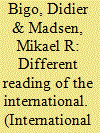

|
|
|
| 5 |
ID:
160875
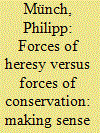

|
|
|
|
|
| Summary/Abstract |
Ethnicity and ideology are frequently used to determine whether an armed group is hostile or friendly vis-à-vis the state. By contrast, I argue that the social structure of insurgent movements holds more explanatory power for their respective positions than ethnicity or ideology. To illustrate this, I apply Pierre Bourdieu’s concept of a contest between forces of ‘conservation’ and forces of ‘heresy’ to the current Afghanistan war. I demonstrate that the social structure of the Taleban renders them prone to ‘heresy’, while the formerly second biggest insurgent group, Gulbuddin Hekmatyar’s party, has rather been an impeded force of ‘conservation.’
|
|
|
|
|
|
|
|
|
|
|
|
|
|
|
|
| 6 |
ID:
101367
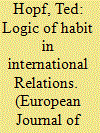

|
|
|
|
|
| Publication |
2010.
|
| Summary/Abstract |
IR theory is dominated by the logics of consequentialism and appropriateness. But Max Weber offered four logics of choice, not just two. Beyond the instrumental rationality of Zweckrationalität and the normative rationality of Wertrationalität are affect and habit. Drawing on Weber, James, Dewey, and Bourdieu, and habit's microfoundations in neurocognitive psychology, I explore the logic of habit and its consequences for several fundamental puzzles in IR theory. The logic of habit necessarily precludes rationality, agency, and uncertainty, and so offers a different interpretation of cooperation, security dilemmas, enduring rivalries, and security communities in international politics. The logic of habit also fills a gap in mainstream constructivism's theorization of intersubjective structures, returning the taken-for-granted lifeworld to the center of attention.
|
|
|
|
|
|
|
|
|
|
|
|
|
|
|
|
| 7 |
ID:
101374
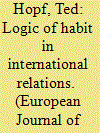

|
|
|
|
|
| Publication |
2010.
|
| Summary/Abstract |
IR theory is dominated by the logics of consequentialism and appropriateness. But Max Weber offered four logics of choice, not just two. Beyond the instrumental rationality of Zweckrationalität and the normative rationality of Wertrationalität are affect and habit. Drawing on Weber, James, Dewey, and Bourdieu, and habit's microfoundations in neurocognitive psychology, I explore the logic of habit and its consequences for several fundamental puzzles in IR theory. The logic of habit necessarily precludes rationality, agency, and uncertainty, and so offers a different interpretation of cooperation, security dilemmas, enduring rivalries, and security communities in international politics. The logic of habit also fills a gap in mainstream constructivism's theorization of intersubjective structures, returning the taken-for-granted lifeworld to the center of attention.
|
|
|
|
|
|
|
|
|
|
|
|
|
|
|
|
| 8 |
ID:
108235
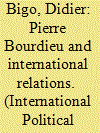

|
|
|
|
|
| Publication |
2011.
|
| Summary/Abstract |
This article demonstrates how the work of Pierre Bourdieu offers a productive way to practice research in international relations. It especially explores the alternatives opened by Bourdieu in terms of a logic of practice and practical sense that refuses an opposition between general theory and empirical research. Bourdieu's preference for a relational approach, which destabilizes the different versions of the opposition between structure and agency, avoids some of the traps commonly found in political science in general and theorizations of international relations in particular: essentialization and ahistoricism; a false dualism between constructivism and empirical research; and an absolute opposition between the collective and the individual. The "thinking tools" of field and habitus, which are both collective and individualized, are examined in order to see how they resist such traps. The article also engages with the question of whether the international itself challenges some of Bourdieu's assumptions, especially when some authors identify a global field of power while others deny that such a field of power could be different from a system of different national fields of power. In this context, the analysis of transversal fields of power must be untied from state centrism in order to discuss the social transformations of power relations in ways that do not oppose a global/international level to a series of national and subnational levels.
|
|
|
|
|
|
|
|
|
|
|
|
|
|
|
|
| 9 |
ID:
097373
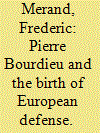

|
|
|
|
|
| Publication |
2010.
|
| Summary/Abstract |
This paper uses an analytical framework derived from Pierre Bourdieu's sociology to explain the genesis of the European Security and Defense Policy (ESDP). Long-term social and institutional processes at work in the making of ESDP are addressed through an emphasis on the institutionalization of social fields, the impact of structural crises, and the socialization of policy makers into specific schemes of perception and action (habitus). Two arguments follow from this framework. First, the paper shows that the creation of ESDP after 1998 would have been impossible without the prior institutionalization of two transgovernmental arenas: (1) the European foreign policy field, wherein EU diplomats vie for influence over EU policies; and (2) the international defense field, centered upon military relations within NATO. Second, ESDP results from the strategies of a number of diplomats and military leaders who, following the end of the Cold War, perceived that they faced important organizational crises in their respective fields. This sociological framework provides a more nuanced account of ESDP's creation than that proposed by the two dominant explanations in international relations theory-realism's balancing and constructivism's strategic culture convergence. Combining structural and ideational factors, it elucidates three empirical puzzles: the lack of opposition to ESDP when it was launched, the motives of policy makers who proposed ESDP, and the disappearance of alternative options for the European security architecture.
|
|
|
|
|
|
|
|
|
|
|
|
|
|
|
|
| 10 |
ID:
171790
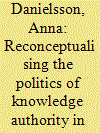

|
|
|
|
|
| Summary/Abstract |
Peacebuilding debates increasingly revolve around questions about knowledge and expertise. Of particular interest is what (and whose) knowledge(s) ends up authoritative in interventions. This article addresses a problem in the literature on the epistemics and epistemic authority of peacebuilding interventions: the acknowledgement of but lacking attention to plural knowledges, the transgressive character of expertise, and knowledge struggles. It does this by discussing recent suggestions that peacebuilding epistemic authority can be fruitfully analysed as a Bourdieusian field. The article identifies a tension in Bourdieu's own thinking about fields, which has shaped some of these recent proposals. This tension, nevertheless, also enables a reconsideration of fields and struggles, and thereby an analysis that takes plurality and transgressiveness into account. By developing such an alternative conceptual position, the article sees peacebuilding epistemic authority as object- and struggle-bound; conditioned and dependent on dynamics that go beyond peacebuilding as a distinct field of practice. This position is illustrated in an analysis of the emergence and (temporary) establishment of epistemic authority in peacebuilding interventions on informal economies.
|
|
|
|
|
|
|
|
|
|
|
|
|
|
|
|
| 11 |
ID:
108236
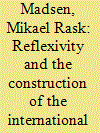

|
|
|
|
|
| Publication |
2011.
|
| Summary/Abstract |
Recent years have seen a surge of interest in applying the sociology of Pierre Bourdieu in international studies as part of a more general sociological turn observable in both international and European studies. However, different from earlier attempts at deploying Bourdieusian sociology in the context of international law, economics, and politics, most of this new Bourdieu-inspired constructivist political science research only marginally addresses what in many ways was the cardinal point of Bourdieu's work: his attempt at devising a reflexive sociology. This article's basic claim is that the most significant contribution Bourdieusian sociology can make to international (and European) studies is not achieved by adaptation or transplantation of key concepts (field, habitus, and so on) to a set of research objects that remain by and large predefined by other disciplines. Instead, I contend that it is by deploying the underlying sociological practice of Bourdieusian sociology to international objects in terms of conducting a reflexive sociology of the international. To substantiate my claim, I make three more specific arguments. In the first section, I argue for the need for "objectivizing" the research object in terms of "double reflexivity" with respect to both object and researcher. In the second part, I suggest that key Bourdieusian notions are precisely tools for this scientific operation by providing a relational and integrative approach. In the third part, I compare this approach with a cross section of research on international human rights and thereby suggest how it provides a different reading of the international.
|
|
|
|
|
|
|
|
|
|
|
|
|
|
|
|
| 12 |
ID:
109591
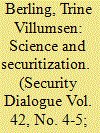

|
|
|
|
|
| Publication |
2011.
|
| Summary/Abstract |
The interface between science and securitization has not been systematically addressed. This article argues from a Bourdieusian viewpoint that scientific arguments and 'facts' are at work in at least three distinct mechanisms within and around securitization. First, science communities/explanations can come to objectify an issue to the extent where securitization - and even politicization - becomes next to impossible. Second, science co-determines the status of a securitizing actor and thus influences the authority of the speaker in specific fields. Third, scientific facts can be mobilized in securitization claims by securitizing actors in attempts to seek back-up in the objective, disinterested aura of the scientific vocation. The RAND Corporation's objectivation of the issue of nuclear deterrence is taken as an example of the first mechanism, while climate change and democratic peace illustrate the other two mechanisms. The article questions whether securitization theory has adequately addressed the issue of context, points to a new research agenda and carves out practical reflexivity for security experts.
|
|
|
|
|
|
|
|
|
|
|
|
|
|
|
|
|
|
|
|
|